- Home
- Deborah Harkness
A Discovery of Witches Page 23
A Discovery of Witches Read online
Page 23
“I took advantage of your fear. I shouldn’t have,” he whispered.
My eyes were closed, and I still felt intoxicated, his cinnamon and clove scent driving off the scent of violets from the wine. Restless, I stirred in his grip.
“Be still,” he said, voice harsh. “I might not be able to control myself if you step away.”
He’d warned me in the lab about the relationship between predator and prey. Now he was trying to get me to play dead so the predator in him would lose interest in me.
But I wasn’t dead.
My eyes flew open. There was no mistaking the sharp look on his face. It was avid, hungry. Matthew was a creature of instinct now. But I had instincts, too.
“I’m safe with you.” I formed the words with lips that were freezing and burning at the same time, unused to the feeling of a vampire’s kiss.
“A witch—safe with a vampire? Never be sure of that. It would only take a moment. You wouldn’t be able to stop me if I struck, and I wouldn’t be able to stop myself.” Our eyes met and locked, neither of us blinking. Matthew made a low sound of surprise. “How brave you are.”
“I’ve never been brave.”
“When you gave blood in the lab, the way you meet a vampire’s eyes, how you ordered the creatures out of the library, even the fact that you go back there day after day, refusing to let people keep you from what you want to do—it’s all bravery.”
“That’s stubbornness.” Sarah had explained the difference a long time ago.
“I’ve seen courage like yours before—from women, mostly.” Matthew continued as if I hadn’t spoken. “Men don’t have it. Our resolve is born out of fear. It’s merely bravado.”
His glance flickered over me in snowflakes that melted into mere coolness the moment they touched me. One cold finger reached out and captured a tear from the tips of my eyelashes. His face was sad as he lowered me gently into the chair and crouched next to me, resting one hand on my knee and the other on the arm of the rush-seated chair in a protective circle. “Promise me that you will never joke with a vampire—not even me—about blood or how you might taste.”
“I’m sorry,” I whispered, forcing myself not to look away.
He shook his head. “You told me before that you don’t know much about vampires. What you need to understand is that no vampire is immune to this temptation. Vampires with a conscience spend most of their time trying not to imagine how people would taste. If you were to meet one without a conscience—and there are plenty who fit that category—then God help you.”
“I didn’t think.” I still couldn’t. My mind was whirling with the memory of his kiss, his fury, and his palpable hunger.
He bowed his head, resting the crown against my shoulder. The ampulla from Bethany tumbled out of the neck of his sweater and swung like a pendulum, its tiny coffin glinting in the light from the candles.
He spoke so softly that I had to strain to hear. “Witches and vampires aren’t meant to feel this way. I’m experiencing emotions I’ve never—” He broke off.
“I know.” Carefully I leaned my cheek against his hair. It felt as satiny as it looked. “I feel them, too.”
Matthew’s arms had remained where he left them, one hand on my knee and the other on the arm of the chair. At my words he moved them slowly and clasped my waist. The coldness of his flesh cut through my clothing, but I didn’t shiver. Instead I moved closer so that I could rest my arms on his shoulders.
A vampire evidently could have remained comfortable in that position for days. For a mere witch, however, it wasn’t an option. When I shifted slightly, he looked at me in confusion, and then his face lightened in recognition.
“I forgot,” he said, rising with his swift smoothness and stepping away from me. I moved first one leg and then the other, restoring the circulation to my feet.
Matthew handed me my wine and returned to his own seat. Once he was settled, I tried to give him something to think about other than how I might taste.
“What was the fifth question you had to answer for the Prize Fellowship?” Candidates were invited to sit an exam that involved four questions combining thought-provoking breadth and depth with devilish complexity. If you survived the first four questions, you were asked the famous “fifth question.” It was not a question at all, but a single word like “water,” or “absence.” It was up to the candidate to decide how to respond, and only the most brilliant answer won you a place at All Souls.
He reached across the table—without setting himself on fire—and poured some more wine into my glass. “Desire,” he said, studiously avoiding my eyes.
So much for that diversionary plan.
“Desire? What did you write?”
“As far as I can tell, there are only two emotions that keep the world spinning, year after year.” He hesitated, then continued. “One is fear. The other is desire. That’s what I wrote about.”
Love hadn’t factored into his response, I noticed. It was a brutal picture, a tug-of-war between two equal but opposing impulses. It had the ring of truth, however, which was more than could be said of the glib “love makes the world go round.” Matthew kept hinting that his desire—for blood, chiefly—was so strong that it put everything else at risk.
But vampires weren’t the only creatures who had to manage such strong impulses. Much of what qualified as magic was simply desire in action. Witchcraft was different—that took spells and rituals. But magic? A wish, a need, a hunger too strong to be denied—these could turn into deeds when they crossed a witch’s mind.
And if Matthew was going to tell me his secrets, it didn’t seem fair to keep mine so close.
“Magic is desire made real. It’s how I pulled down Notes and Queries the night we met,” I said slowly. “When a witch concentrates on something she wants, and then imagines how she might get it, she can make it happen. That’s why I have to be so careful about my work.” I took a sip of wine, my hand trembling on the glass.
“Then you spend most of your time trying not to want things, just like me. For some of the same reasons, too.” Matthew’s snowflake glances flickered across my cheeks.
“If you mean the fear that if I started, there would be no stopping me—yes. I don’t want to look back on a life where I took everything rather than earned it.”
“So you earn everything twice over. First you earn it by not simply taking it, and then you earn it again through work and effort.” He laughed bitterly. “The advantages of being an otherworldly creature don’t amount to much, do they?”
Matthew suggested we sit by his fireless fireplace. I lounged on the sofa, and he carried some nutty biscuits over to the table by me, before disappearing into the kitchen once more. When he returned, he was carrying a small tray with the ancient black bottle on it—the cork now pulled—and two glasses of amber-colored liquid. He handed one to me.
“Close your eyes and tell me what you smell,” he instructed in his Oxford don’s voice. My lids dropped obediently. The wine seemed at once old and vibrant. It smelled of flowers and nuts and candied lemons and of some other, long-past world that I had—until now—been able only to read about and imagine.
“It smells like the past. But not the dead past. It’s so alive.”
“Open your eyes and take a sip.”
As the sweet, bright liquid went down my throat, something ancient and powerful entered my bloodstream. This must be what vampire blood tastes like. I kept my thoughts to myself.
“Are you going to tell me what it is?” I asked around the flavors in my mouth.
“Malmsey,” he replied with a grin. “Old, old malmsey.”
“How old?” I said suspiciously. “As old as you are?”
He laughed. “No. You don’t want to drink anything as old as I am. It’s from 1795, from grapes grown on the island of Madeira. It was quite popular once, but nobody pays much attention to it now.”
“Good,” I said with greedy satisfaction. “All the more for me.” He laugh
ed again and sat easily in one of his Morris chairs.
We talked about his time at All Souls, about Hamish—the other Prize Fellow, it turned out—and their adventures in Oxford. I laughed at his stories of dining in hall and how he’d bolted to Woodstock after every meal to clean the taste of overcooked beef from his mouth.
“You look tired,” he finally said, standing after another glass of malmsey and another hour of conversation.
“I am tired.” Despite my fatigue, there was something I needed to tell him before he took me home. I put my glass down carefully. “I’ve made a decision, Matthew. On Monday I’ll be recalling Ashmole 782.”
The vampire sat down abruptly.
“I don’t know how I broke the spell the first time, but I’ll try to do it again. Knox doesn’t have much faith that I’ll succeed.” My mouth tightened. “What does he know? He hasn’t been able to break the spell once. And you might be able to see the words in the magical palimpsest that lie under the images.”
“What do you mean, you don’t know what you did to break the spell?” Matthew’s forehead creased with confusion. “What words did you use? What powers did you call upon?”
“I broke the spell without realizing it,” I explained.
“Christ, Diana.” He shot to his feet again. “Does Knox know that you didn’t use witchcraft?”
“If he knows, I didn’t tell him.” I shrugged. “Besides, what does it matter?”
“It matters because if you didn’t break the enchantment, then you met its conditions. Right now the creatures are waiting to observe whatever counterspell you used, copy it if they can, and get Ashmole 782 themselves. When your fellow witches discover that the spell opened for you of its own accord, they won’t be so patient and well behaved.”
Gillian’s angry face swam before my eyes, accompanied by a vivid recollection of the lengths she reported witches had gone to in order to pry secrets from my parents. I brushed the thoughts aside, my stomach rolling, and focused on the flaws in Matthew’s argument.
“The spell was constructed more than a century before I was born. That’s impossible.”
“Just because something seems impossible doesn’t make it untrue,” he said grimly. “Newton knew that. There’s no telling what Knox will do when he understands your relationship to the spell.”
“I’m in danger whether I recall the manuscript or not,” I pointed out. “Knox isn’t going to let this go, is he?”
“No,” he agreed reluctantly. “And he wouldn’t hesitate to use magic against you even if every human in the Bodleian saw him do it. I might not be able to reach you in time.”
Vampires were fast, but magic was faster.
“I’ll sit near the desk with you, then. We’ll know as soon as the manuscript’s delivered.”
“I don’t like this,” Matthew said, clearly worried. “There’s a fine line between bravery and recklessness, Diana.”
“It’s not reckless—I just want my life back.”
“What if this is your life?” he asked. “What if you can’t keep the magic away after all?”
“I’ll keep parts of it.” Remembering his kiss, and the sudden, intense feeling of vitality that had accompanied it, I looked straight into his eyes so he would know he was included. “But I’m not going to be bullied.”
Matthew was still worrying over my plan as he walked me home. When I turned in to New College Lane to use the back entrance, he caught my hand.
“Not on your life,” he said. “Did you see the look that porter gave me? I want him to know you’re safely in college.”
We navigated the uneven sidewalks of Holywell Street, past the entrance to the Turf pub, and through the New College gates. We strolled by the watchful porter, still hand in hand.
“Will you be rowing tomorrow?” Matthew asked at the bottom of my staircase.
I groaned. “No, I’ve got a thousand letters of recommendation to write. I’m going to stay in my rooms and clear my desk.”
“I’m going to Woodstock to go hunting,” he said casually.
“Good hunting, then,” I said, equally casually.
“It doesn’t bother you at all to know I’ll be out culling my own deer?” Matthew sounded taken aback.
“No. Occasionally I eat partridge. Occasionally you feed on deer.” I shrugged. “I honestly don’t see the difference.”
Matthew’s eyes glittered. He stretched his fingers slightly but didn’t let go of my hand. Instead he lifted it to his lips and put a slow kiss on the tender flesh in the hollow of my palm.
“Off to bed,” he said, releasing my fingers. His eyes left trails of ice and snow behind as they lingered not only over my face but my body, too.
Wordlessly I looked back at him, astonished that a kiss on the palm could be so intimate.
“Good night,” I breathed out along with my next exhale. “I’ll see you Monday.”
I climbed the narrow steps to my rooms. Whoever tightened the doorknob had made a mess of the lock, and the metal hardware and the wood were covered in fresh scratches. Inside, I switched on the lights. The answering machine was blinking, of course. At the window I raised my hand to show that I was safely inside.
When I peeked out a few seconds later, Matthew was already gone.
Chapter 15
On Monday morning the air had that magically still quality common in autumn. The whole world felt crisp and bright, and time seemed suspended. I shot out of bed at dawn and pulled on my waiting rowing gear, eager to be outdoors.
The river was empty for the first hour. As the sun broke over the horizon, the fog burned off toward the waterline so that I was slipping through alternate bands of mist and rosy sunshine.
When I pulled up to the dock, Matthew was waiting for me on the curving steps that led to the boathouse’s balcony, an ancient brown-and-bone-striped New College scarf hanging around his neck. I climbed out of the boat, put my hands on my hips, and stared at him in disbelief.
“Where did you get that thing?” I pointed at the scarf.
“You should have more respect for the old members,” he said with his mischievous grin, tossing one end of it over his shoulder. “I think I bought it in 1920, but I can’t honestly remember. After the Great War ended, certainly.”
Shaking my head, I took the oars into the boathouse. Two crews glided by the dock in perfect, powerful unison just as I was lifting my boat out of the water. My knees dipped slightly and the boat swung up and over until its weight rested on my head.
“Why don’t you let me help you with that?” Matthew said, rising from his perch.
“No chance.” My steps were steady as I walked the boat inside. He grumbled something under his breath.
With the boat safely in its rack, Matthew easily talked me into breakfast at Mary and Dan’s café. He was going to have to sit next to me much of the day, and I was hungry after the morning’s exertions. He steered me by the elbow around the other diners, his hand firmer on my back than before. Mary greeted me like an old friend, and Steph didn’t bother with a menu, just announced “the usual” when she came by the table. There wasn’t a hint of a question in her voice, and when the plate came—laden with eggs, bacon, mushrooms, and tomatoes—I was glad I hadn’t insisted on something more ladylike.
After breakfast I trotted through the lodge and up to my rooms for a shower and a change of clothes. Fred peered around his window to see if it was indeed Matthew’s Jaguar pulled up outside the gates. The porters were no doubt laying wagers on competing predictions regarding our oddly formal relationship. This morning was the first time I’d managed to convince my escort to simply drop me off.
“It’s broad daylight, and Fred will have kittens if you clog up his gate during delivery hours,” I protested when Matthew started to get out of the car. He’d glowered but agreed that merely pulling straight across the entrance to bar possible vehicular attack was sufficient.
This morning every step of my routine needed to be slow and deliberate. My show
er was long and leisurely, the hot water slipping against my tired muscles. Still in no rush, I put on comfortable black trousers, a turtleneck to keep my shoulders from seizing up in the increasingly chilly library, and a reasonably presentable midnight blue cardigan to break up the unalleviated black. My hair was caught in a low ponytail. The short piece in the front fell forward as it always did, and I grumbled and shoved it behind my ear.
In spite of my efforts, my anxiety rose as I pushed open the library’s glass doors. The guard’s eyes narrowed at my uncharacteristically warm smile, and he took an inordinate amount of time checking my face against the picture on my reader’s card. Finally he admitted me, and I pelted up the stairs to Duke Humfrey’s.
It had been no more than an hour since I’d been with Matthew, but the sight of him stretched out among the first bay of Elizabethan desks in one of the medieval wing’s purgatorial chairs was welcome. He looked up when my laptop dropped on the scarred wooden surface.
“Is he here?” I whispered, reluctant to say Knox’s name.
Matthew nodded grimly. “In the Selden End.”
“Well, he can wait down there all day as far as I’m concerned,” I said under my breath, picking up a blank request slip from the shallow rectangular tray on the desk. On it I wrote “Ashmole MS 782,” my name, and my reader number.
Sean was at the collection desk. “I’ve got two items on reserve,” I told him with a smile. He went into the cage and returned with my manuscripts, then held out his hand for my new request. He put the slip into the worn, gray cardboard envelope that would be sent to the stacks.
“May I talk to you a minute?” Sean asked.
“Sure.” I gestured to indicate that Matthew should stay where he was and followed Sean through the swinging gate into the Arts End, which, like the Selden End, ran perpendicular to the length of the old library. We stood beneath a bank of leaded windows that let in the weak morning sunshine.
“Is he bothering you?”
“Professor Clairmont? No.”

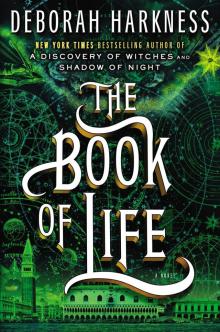 The Book of Life
The Book of Life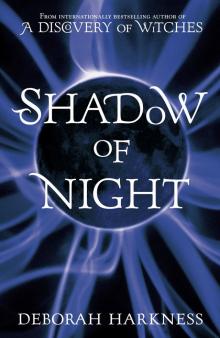 Shadow of Night
Shadow of Night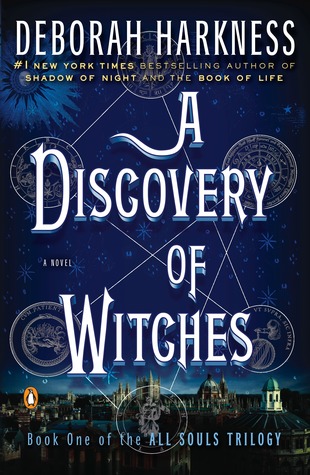 A Discovery of Witches
A Discovery of Witches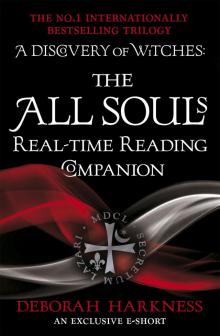 The All Souls Real-Time Reading Companion
The All Souls Real-Time Reading Companion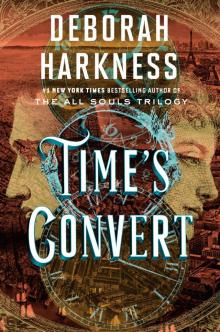 Time's Convert
Time's Convert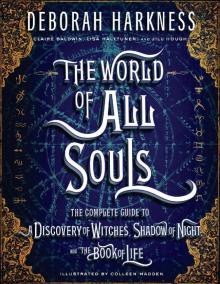 The World of All Souls
The World of All Souls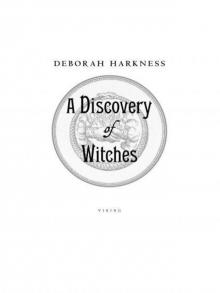 A Discovery of Witches: A Novel (All Souls Trilogy)
A Discovery of Witches: A Novel (All Souls Trilogy)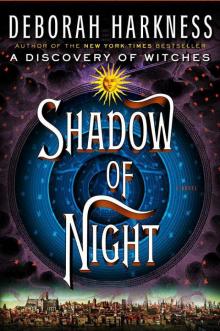 Shadow of Night: A Novel
Shadow of Night: A Novel